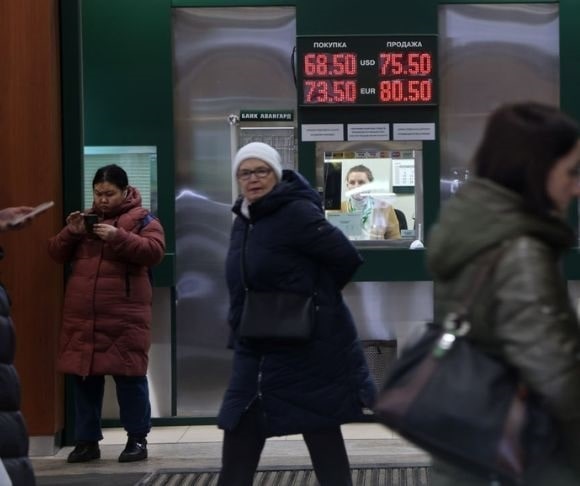The international community has attempted to pummel Russia into submission amid its invasion of Ukraine. Many world leaders expected the Russian economy to suffer a collapse, but Moscow has been holding steady for the past year, with not too many signs of a financial crisis on the horizon. A new report suggests that the Eastern European nation could outperform the world’s largest economy in two years, leaving some scratching their heads at this prognostication. Could it become a reality?
Russian Economy Will Break You
 The International Monetary Fund (IMF) released its latest global economic outlook. The group upgraded its world forecast for the first time in a year, declaring that the planet is not heading for a recession this year. This is much different from what IMF chief Kristalina Georgieva said last month, warning that a third of the globe would endure an economic downturn and everyone else would feel like it is a recession. Perhaps this is the old joke about the economist with many hands.
The International Monetary Fund (IMF) released its latest global economic outlook. The group upgraded its world forecast for the first time in a year, declaring that the planet is not heading for a recession this year. This is much different from what IMF chief Kristalina Georgieva said last month, warning that a third of the globe would endure an economic downturn and everyone else would feel like it is a recession. Perhaps this is the old joke about the economist with many hands.
“Global conditions have improved as inflation pressures started to abate,” said IMF chief economist Pierre-Olivier Gourinchas at a news conference in Singapore. “The road back to a full recovery with sustainable growth, stable prices, and progress for all has only started.”
But the notable prediction for the next two years is the strength of the Russian economy. The IMF anticipates Russia’s gross domestic product (GDP) will rebound to 0.3% in 2023 and grow by 2.1% in 2024. By comparison, IMF economists project that the US GDP growth rate will be 1.4% this year and 1% in 2024 amid higher interest rates weighing on the United States.
This might be a remarkable expectation since Russia has essentially been prohibited from participating in capital markets, forced to trade with a small group of nations, and ensure that global energy commodities remain elevated to keep the Kremlin’s war chest intact. It is also an incredible projection as it suggests that the policies presented by the leadership in Washington, London, Brussels, and other advanced economies have failed. Ultimately, if these numbers come to fruition, it would revitalize Moscow and renew the nation’s confidence in President Vladimir Putin and his potential successors.
So, what do the latest economic data show? Is Russia standing tall, or is it on the brink of annihilation?
Russian to See the Data
In September, Liberty Nation reported that the Russian economy had yet to collapse, despite promises from talking heads worldwide. Last fall, the numbers were surprising. Fast forward to the early days of 2023, and the economic data have held steady.

(Photo Illustration by Rafael Henrique/SOPA Images/LightRocket via Getty Images)
The S&P Global Russia Manufacturing Purchasing Managers’ Index (PMI) is the first key metric. Despite sliding to a three-month low of 52.6 in January, the expansion rate in the sector has been higher than the series’ average and grew at the fastest pace in four years. Moreover, since the beginning of the war, the PMI has only contracted twice: March and April.
“The upturn was driven by a further uptick in production, fewer supply delays and a faster expansion in new orders. Stronger demand conditions were linked to domestic customers, as new export orders contracted strongly. Greater new orders spurred firms to expand their hiring activity, as employment rose at a solid pace,” wrote S&P Global in its February report. “As a result, sufficient capacity led to a modest drop in backlogs of work. The use of stocks to fulfill production requirements led firms to increase input buying sharply.”
Since May, the month-over-month consumer price index (CPI) has held steady, ranging from -0.5% to 0.8%, according to the Federal State Statistics Service (FSSS). The producer price index (PPI) has also been in deflation mode for the last eight months, plummeting as much as -6.9% on a monthly basis. Some will contend that competent monetary policymaking at the Bank of Russia contributed to decent inflation data, as officials raised interest rates at the beginning of the war and started slashing the benchmark policy rate as inflation began showing signs of easing.
On the labor front, the unemployment rate is below 4%, and real wage growth (inflation-adjusted) turned positive in October for the first time since March.
The world is also watching Putin’s foreign exchange (forex) reserves, which comprise everything from precious metals to global currencies, that help fund his war in Ukraine. When the Russian leader launched his invasion, reserves stood at approximately $600 billion. As of December, it hovers around $580 billion and has steadily risen since the summer’s end. The Russian ruble also gained about 5% against the US dollar in the first month of 2023.

(Photo by Contributor/Getty Images)
But it is not all hammers and sickles in the former Soviet Union. Retail sales have cratered, industrial production has plunged, business and consumer confidence levels have weakened, and the composite and services PMI readings are stuck in contraction territory. Still, considering Russia’s access to some of the world’s biggest markets has been cut off, Moscow is holding its own. But for how long?
Bet Against America?
Legendary billionaire Warren Buffett has repeatedly said over the years to “never bet against America.” But how about for the next couple of years? The nation is debating how mild or severe the next recession will be, from short and shallow to a rolling one to a full-blown financial crisis. The future of the US might seem bleaker, considering its astronomical national debt, perpetual trillion-dollar budget deficits, hundreds of trillions of dollars in unfunded liabilities and expenditures, and a tapped-out and dependent citizenry. In the game of Swamponomics, politicians will focus on 2024. But understanding the country’s fiscal health requires keeping an eye out for 2034. Putin and BRICS allies are concentrating on the long term, which might help the Russian economy in the 21st century. Will Washington?




